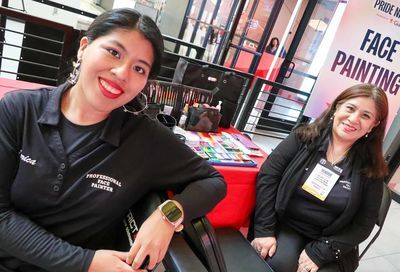As You Are Bar on track to become DC’s newest queer space
Owners of Barracks Row venue agreed a settlement with the local ANC to alleviate neighbors' concerns
By John Riley on January 26, 2022 @JRileyMW

As You Are Bar, the bar, restaurant, coffeehouse, and community gathering space geared towards D.C.’s queer community, took another step closer to opening after the local Advisory Neighborhood Commission negotiated and approved a settlement agreement that would allow the venue to stay open until 3 a.m. on weekends, serve liquor, and host dance parties on Friday and Saturday nights.
Under the terms of the settlement agreement, As You Are Bar agrees to take steps to mitigate sound so that its pre-recorded music — both on weekends for dance nights and from Sunday through Thursday, when the space will act more as a bar/restaurant/café, — will not disturb nearby residents and businesses; abide by certain guidelines regarding food service, outdoor dining, and sanitation relating to general upkeep of the property; and follow an agreed-upon security plan so that staffers will be able to disperse crowds in a quiet, controlled manner that will reduce instances of loitering, drunken behavior, or disturbances following closing time.
The new venue, the brainchild of Jo McDaniel and Rach Pike, will be located at 500 8th St. SE in the building that previously housed Banana Café and Piano Bar and District Soul Food. As part of the agreement, McDaniel and Pike agreed to terms that they will funnel patrons, whether on foot or seeking ride-shares, out of the bar and onto 8th Street SE as closing time approaches, in order to avoid disturbing neighbors on E Street SE.
During the nearly 3-hour-long virtual meeting called by local Advisory Neighborhood Commission 6B, some commissioners quibbled over the wording of the settlement agreement for several hours, with many asserting that they did not want As You Are Bar to become a nuisance that would disrupt the peace and character of the nearby residential area, despite the fact that the 8th Street corridor along Barracks Row has long been home to commercial space, including several bars and taverns that stay open until the early morning hours on weekends.
A particular sticking point in negotiations came when commissioners balked at a provision requested by the bar’s lawyer, Richard Bianco, who wanted to ensure that his clients would not be fined twice for a single violation of the settlement agreement that also violates the Code of the District of Columbia. In particular, Commissioner Gerry Sroufe and neighborhood resident Ellen Opper-Weiner, a lawyer, balked at language that they felt would allow the bar to flout the terms of the settlement agreement, arguing that a violation of D.C. Code, such as a noise or crowd size violation, would also violate the terms of the settlement agreement.
After several minutes of squabbling back and forth over language in that section, the ANC adopted revised language reading: “Nothing in this agreement is intended to impose duplicative fines on the applicant for a violation of D.C. law and a violation of this agreement for the same conduct.” The commissioners then voted unanimously to approve the settlement agreement, with the understanding that technical revisions regarding language will be made at a future point in time.
Under D.C. law and regulations set forth by the District’s Alcoholic Beverage Regulation Administration, applicants for a liquor license work with their local ANC to negotiate a settlement agreement outlining specific actions or conditions that may be the source of a later dispute, such as trash removal, noise violations, or capacity restrictions. That settlement agreement then serves as a reference point for what the parties previously agreed upon, and is used in determining whether a venue has complied with the agreement’s terms whenever a complaint is lodged against the venue, or when the liquor license is up for renewal.
By having the settlement agreement approved, As You Are Bar has overcome a significant hurdle to opening, as Advisory Neighborhood Commissions in D.C. usually serve as the last wave of resistance to an establishment seeking a liquor license. Many of those who attended the virtual ANC meeting spoke in favor of the bar, recounting their positive interactions with Pike or McDaniel, and expressing hope that the space would be an asset to the neighborhood.
The generally positive tone of many of the public comments was a stark contrast from a hostile and tense ANC meeting earlier this month, when a handful of residents concerned about issues like noise, drunk and disorderly patrons, and public safety lobbed attacks against As You Are Bar, with some even suggesting that the bar, like its predecessors, would ultimately fail or would lead to frequent disputes between residential neighbors and As You Are staff. But on Tuesday, many of the public commenters had nothing but positive things to say.

“My family and I would find it extremely meaningful to have these amazing proprietors run their business in our neighborhood,” neighborhood resident Sean Cuddihy told the ANC commissioners. “I appreciate all the time that you, as volunteers, have put into these negotiations and the incredible investments that you have made. And I hope you’ll vote to allow this business to move forward.”
Sarah Greenberg, another neighborhood resident, sought to dispel residents’ concerns over potential noise problems, saying she went to visit As You Are Bar during a recent soundcheck and didn’t notice any issue with the volume when she was outside the venue.
“When I walked over, I literally thought it hadn’t even started yet because I couldn’t hear anything until I got inside. But when I got upstairs, the music was playing at the volume I would expect on a Friday or Saturday night,” Greenberg said. “I think you’d be really hard pressed to find business owners that are more responsive, community oriented people…. I think this is going to be a really valuable space for the community, and I’m really excited for it to open.”
Other speakers noted that As You Are Bar is more than just a typical drinking establishment, hoping to offer a safe space for members of the queer community, regardless of age, race, gender, or even familial status. A few members of the deaf and hard-of-hearing community, and even some cisgender women, testified that they believed the venue would provide their respective communities a safe space to congregate as well.
“I run a really popular blog, but when I shared about the As You Are Bar happening, I had so many people say that they’d never come to the Barracks Row area and that they’re super excited to go,” said Jade Womack, an Adams Morgan resident. “I’m not even part of the LGBT community, but there really aren’t many places for a single, cis woman to go to, alone, drinking by themselves, I trust Rachel and Jo to create that space.”
“I just want to re-emphasize as someone who’s new to the queer community, this isn’t just a drinking spot,” added one attendee named Brenna. “They are focused on community and building a sense of belonging. And I think that’s very important for any neighborhood in D.C., and any neighborhood in D.C. would be honored to welcome that to their community.”
As negotiations over the settlement agreement drew to a close, Mike Silverstein, an openly gay commissioner from ANC 2B, in the Dupont Circle neighborhood, recalled the progress he had seen over his life in terms of acceptance of the queer community, and reiterated his belief that As You Are Bar will provide needed space for LGBTQ individuals searching for a place to belong.
“I was maybe 20 years old when Stonewall happened. I was in college and I was transfixed by it, but deeply in the closet, and I knew that if I would ever say anything, I would probably lose my many of my friends, that my hopes of ever being a broadcast journalist would be gone, I’d probably be kicked out of my fraternity and all those other things,” Silverstein said. “Over my life, I’ve seen other people work to make it possible for me to be myself…. Rach and Jo, you are so beloved by the community, and I’m absolutely convinced that your community on Capitol Hill will come to know you and love you the way that the rest of us do.”
McDaniel expressed her gratitude to supporters and those who spoke on the bar’s behalf while also seeking to calm the nerves of residents skeptical of whether the bar will be able to abide by the terms of the settlement agreement in good faith.
“We really just want to thank this community. Y’all are the reason we do anything. This is our life’s work. And to the neighbors who have questions, if we are going to protect this community this carefully, I promise your block is safe with us,” McDaniel said, tearing up as she spoke. “We’re going to do everything we can to fulfill these promises. That’s why we’re willing to put it in writing.
“Forgive me, it’s been a really hard couple of weeks. Our characters have been called into question, not because of us, but because of who came before us in this space. And I understand that you all were burned by that situation. But it’s also really hard to be told that we’re liars, even before anyone knows us,” she added. “We’re just asking for a chance…. I really want to thank the commissioners who’ve worked so hard on all of this. And we are so overwhelmingly grateful to the number of people who showed up, giving up your evenings, writing letters of support. We can’t wait to do this for you.”
Cynthia Erivo to Headline WorldPride Concert on June 7
Organizers announced that award-winning actress and singer Cynthia Erivo will headline WorldPride's Street Festival and Concert on June 7.
By John Riley on March 5, 2025 @JRileyMW
Grammy, Emmy, and Tony Award winner Cynthia Erivo has been announced as a headliner of the WorldPride 2025 Street Festival and Concert.
Erivo, a three-time Oscar nominee who portrayed Elphaba in 2024's blockbuster movie Wicked, and who will reprise the role later this year in Wicked Part 2, frequently uses her platform to uplift diverse voices, champion inclusivity, and promote equity and greater LGBTQ representation and visibility.
Last fall, she was honored at the Human Rights Campaign National Dinner, where she was presented with the organization's National Equality Award.
Support Metro Weekly’s Journalism
These are challenging times for news organizations. And yet it’s crucial we stay active and provide vital resources and information to both our local readers and the world. So won’t you please take a moment and consider supporting Metro Weekly with a membership? For as little as $5 a month, you can help ensure Metro Weekly magazine and MetroWeekly.com remain free, viable resources as we provide the best, most diverse, culturally-resonant LGBTQ coverage in both the D.C. region and around the world. Memberships come with exclusive perks and discounts, your own personal digital delivery of each week’s magazine (and an archive), access to our Member's Lounge when it launches this fall, and exclusive members-only items like Metro Weekly Membership Mugs and Tote Bags! Check out all our membership levels here and please join us today!
The Magazine
-
Most Popular
 MISTR's Free DoxyPEP Leads to Huge Drop in STI Rates
MISTR's Free DoxyPEP Leads to Huge Drop in STI Rates  Signature Honors Mandy Patinkin in Emotional Celebration
Signature Honors Mandy Patinkin in Emotional Celebration  Gay Army Reserve Officer in Uniform Sex Video Scandal
Gay Army Reserve Officer in Uniform Sex Video Scandal  'Gray Pride' Protests Hungary's Ban on Gay Pride Marches
'Gray Pride' Protests Hungary's Ban on Gay Pride Marches  Sarah Snook is Astonishing in Broadway's 'Dorian Gray'
Sarah Snook is Astonishing in Broadway's 'Dorian Gray'  Hugh Bonneville Delivers a Show-Stopping Vanya
Hugh Bonneville Delivers a Show-Stopping Vanya  Becca Balint: The Pride of Vermont
Becca Balint: The Pride of Vermont  Air Force Reverses Ban on Pronouns in Email Signatures
Air Force Reverses Ban on Pronouns in Email Signatures  Jared Polis Signs Law Repealing Colorado's Gay Marriage Ban
Jared Polis Signs Law Repealing Colorado's Gay Marriage Ban  A Potent (and Pricey) 'Good Night, And Good Luck'
A Potent (and Pricey) 'Good Night, And Good Luck'
 Becca Balint: The Pride of Vermont
Becca Balint: The Pride of Vermont  Signature Honors Mandy Patinkin in Emotional Celebration
Signature Honors Mandy Patinkin in Emotional Celebration  MISTR's Free DoxyPEP Leads to Huge Drop in STI Rates
MISTR's Free DoxyPEP Leads to Huge Drop in STI Rates  A Potent (and Pricey) 'Good Night, And Good Luck'
A Potent (and Pricey) 'Good Night, And Good Luck'  Sarah Snook is Astonishing in Broadway's 'Dorian Gray'
Sarah Snook is Astonishing in Broadway's 'Dorian Gray'  'Gray Pride' Protests Hungary's Ban on Gay Pride Marches
'Gray Pride' Protests Hungary's Ban on Gay Pride Marches  Jared Polis Signs Law Repealing Colorado's Gay Marriage Ban
Jared Polis Signs Law Repealing Colorado's Gay Marriage Ban  White House Ignores Reporters with Pronouns in Email Signatures
White House Ignores Reporters with Pronouns in Email Signatures  White House Demands NIH Study Transgender Transition "Regret"
White House Demands NIH Study Transgender Transition "Regret"  Air Force Reverses Ban on Pronouns in Email Signatures
Air Force Reverses Ban on Pronouns in Email Signatures
Scene
Metro Weekly
Washington's LGBTQ Magazine
P.O. Box 11559
Washington, DC 20008 (202) 638-6830
About Us pageFollow Us:
· Facebook
· Twitter
· Flipboard
· YouTube
· Instagram
· RSS News | RSS SceneArchives
Copyright ©2024 Jansi LLC.










You must be logged in to post a comment.